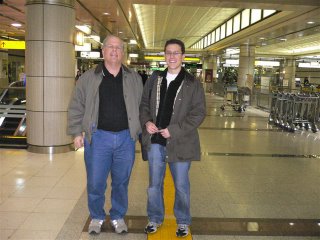
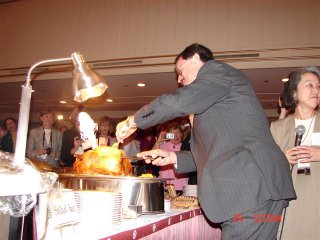
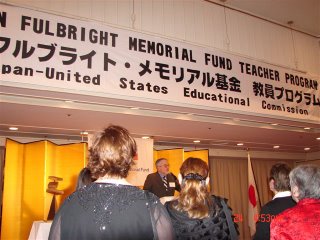
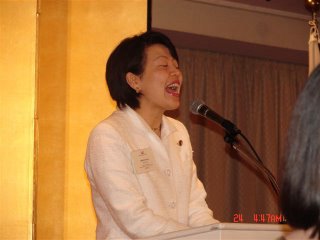
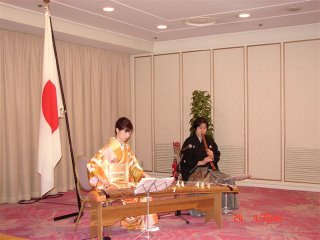
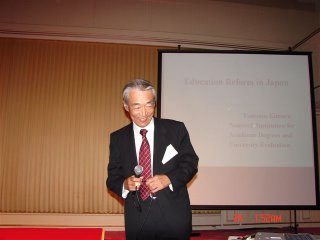
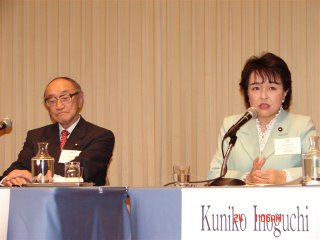
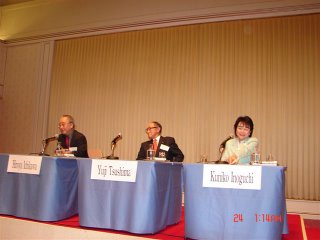
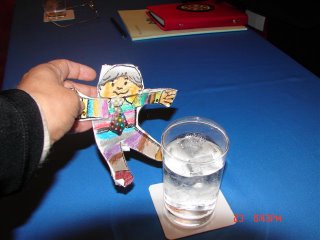
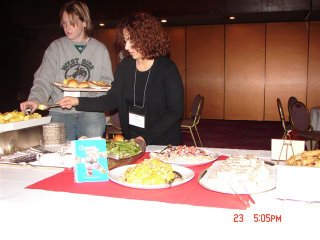
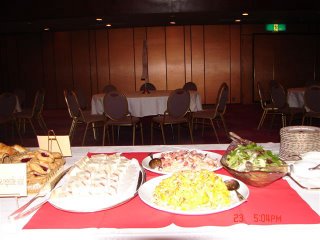
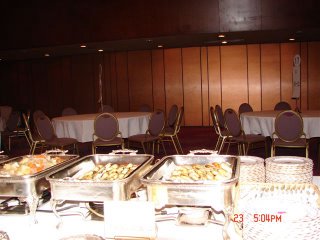
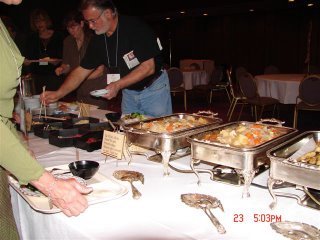
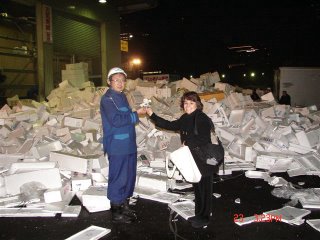

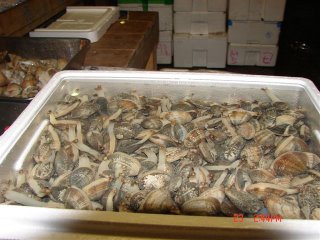



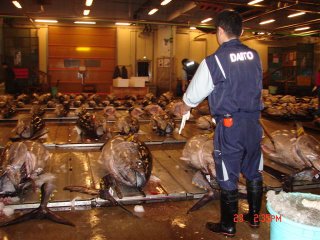
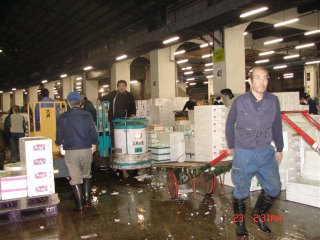

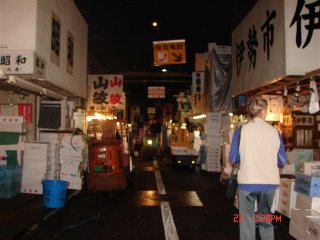
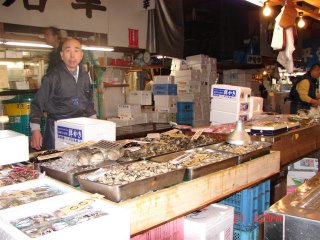
Early Morning Reflection: My day started at 2:30 in the morning. I have not been able to sleep past 2:30 yet. I left a wake-up call. Since I did not answer, they sent a bellboy to wake me up. I cannot believe how attentive the hotel is to our needs. Well, my lack of sleep must be jet lag. I felt a little bit weird not making plans for our two free days, but I will meet Mark, Brian, and Fumitaka's family. I want to keep my schedule free. The other teachers plans sound exciting, expensive, and time consuming. I will see Tokyo first! I wonder how Mark and Brian are doing. I can hardly wait to see them and hear about their experience with Fumitaka.
At 4:00 a.m. I went dowstairs and joined a group going to the fish market. We took a taki. The takis were also an experience in Japan. They are very clean. The taxi drivers wear gloves and the doors opened automatically. They drive on the right side of the street. My fear going so early was finding a taxi to come back on time. Everything had been so on schedule that I did not want to be late for anything. The fish market was interesting, but I did not get to see an auction. It was huge and compared to other fish markets, spotless, and almost silent. It was not as exciting as the Seattle fish market or I was just too tired to have a more positive view. I wonder how much money exchanges hands by 6:00 a.m. at this market on a daily basis. As we were leaving the fish market a taxi appeared and took us back to the hotel without any problems, but charged us more due to traffic. The teachers I went with were nice. I only remeber John, a native American who was going to spend his days in an area near Tokyo. I remember thinking how lucky he was. I like big cities and my assignment was a small rural town.
The schedule of the day was:
7:00-8:30 Breakfast
9:00-9:30: Presentation of books: byKenji Miyazasa
9:45:10:45: Host CityOrientation
11:00-12:30: Japan's Economy: Takahiro Miyao, Profesor, International University of Japan
12:30-2:00 Buffet Lunch
2:00-3:30: Japanese Government: Yuji Tsushima, Diet Member, Kuniko Inoguchi, Minister of the State for Gender Equality and Social Affairs. Moderator: Hiroya Ichikawa, Professor, Faculty of Comparative Culture, Sophia University
3:45-5:15: Japanese Education: Tsutomu Kimura, President, National Institution for Academic Degrees
6:30-8:30: Welcome Reception
Reflection:
As I said before, I joined tours in progress. I do not feel well. I am tired and I do not feel like socializing very much. I think I do not socialize because I know I cannot plan anything with them since I will be with my own family during the free days. Despite my lack of energy, I managed to be at the right place, at the right time and I joined the tour to the fish market without much planning. The group I joined was very nice.
Breakfast was amazing. I loved that rice was served at every meal. I loved their breakfast salads and the potatoe sandwiches. Every day they assigned sitting with a different criteria to insure us meeting as many of the 200 educators as possible.
We received free books. I decided to give the book of poetry to Mr. Britton. A teacher was reading it and she said it was difficult. Charlie could tell me what he thought of it and use it with his students. The other books will go to the Lower Division. I will present them to Susan Bruce because her kids are writing a grant for books. I will also give one book to the Stanley Club because Stanley came with me. After the publishing company made the book presentations, we were asked to sign-up for a Pen Pal Program. One of us will win the opportunity to write to 17 students from Nara. Their English teacher had requested this from the Japan Fulbright Memorial Fund. If I win, I will have to create a service-learning project for this Pen Pal Project.
Host City Orientation: I do not why I was a few minutes late. To make-up for my tardiness, I quickly volunteered to gathered gifts from my group for all the institutions we were visiting. I was surprised by only a few had brought gifts for the schools we were going to visit. I have books about US cities, schools, pens, caps, and candy. If I were to do it all over again, I would prepare a service-learning quilt for each school. I know Caitlin's DVD is a very special gift. I wish I had brought a copy for each school.
Information provided on Yanagawa: 76,000 people, beautiful canals and boats. It is a tourist area, mainly tourism from Korea and China. We would stay at a Japanese style hotel (New Hakury Soh), in a single room. We will eat eel and nori and drink sake, the main products of the region. Yanagawa is the Venice of Japan and a samurai area.
Preparations for our flight to Fukuoka and bus trip to Yanagawa: We were to colored tag our luggage the day before and place it outside our room. We were to take a change of clothing on our handbags. I felt I was taking a cruise to Yanagawa.
Dress code and other details for the Yanagawa trip: We were also told about the required dress code for every day. Our official translator, Mikey, would join us at Fukuoka. We were expecting weather in the 60's and there were no hair dryers in the hotel. The hotel would make two available if needed. We also needed to exchange money at the hotel in Tokyo because there was no foreign currency exchange in Yanagawa. I had already exchange most of the money I wished to spend at the San Francisco Airport, therefore, I was not concerned about it. They also said big stores took credit cards. We were told that NO ENGLISH would be the rule in Yanagawa. I was afraid and excited. From Yanagawa I will not be able to blog because the hotel does not have Internet access.
Economics Lecture: Takahiro Miyao, Professor, International University of Japan, Head, GLOCOM Platform (www.glocom.org): This lecture was amazing. The professor, skillfully and clearily, compared the US and Japan economies. He said that comparing and contrasting them gives a better mutual understanding between the two countries.
The gross domestic product=national income of the USA population is 36,000 compared to the Japanese $ 27,000.
The difference in the saving behavior is USA: National: 15%, household:0%. Japan: National: 25%, Household: 10%. A household in the USA has: cash/ deposits of 15% , Stocks/M. Funds: 45%.
The Japanese household: Cash/Deposits: 60% and Stocks/M. Funds: 10%.
He explained the difference in the following way: 1: Culture, 2: Experience.
US Culture: Consumption=American Dream, Risk=Challenge to take.
Japan's Culture: Concumption=Indulgence, Risk=Gamble to avoid.
Richest People: The biggest surprise to me came when he described the richest generations: USA: Baby Boomers (40-59), post WWII Generation, Consume and Invest in stocks. He was talking about me.
Japan: Elderly (65 and older), Pre WWII Generation, save and hold cash/deposits.
What are the consequences?
USA: Too little savings, too much consumption, more imports than exports (Trade deficit $660 billion in 2003).Japan: Too much savings, too little consumption. More exports than imports (Trade surplus $132 billion in 2003).
What to learn from each other?
USA: Consume less and save more, avoid unnecessary risk in investment, improve manufacturing productivity.JAPAN: Consume more and save less. Take risks and meet challenges. Improve non-manufacturing sectors.
If this area is of interest, there is a forum: www.glocom.org. Thank you Mr. Miyao. It was an easy presentation to follow.
Two members of the Diet talked to us after lunch. It was interesting to see how respectful the staff was and how they made us behave.
Japanese Politics Lecture: Diet Members
Kuniko Inoguchi, Minister of State for Gender Equality and Social Affairs
Yuji Tsushima, House of Representatives
The focus of the presentation was a description of the Diet, how it works, the latest election, issues on citizen involvement in Japanese government policies and gender equality.
What is the Diet? Defined by the Constitution of Japan as the highest organ of state power and the sole law-making organ of the state.
The House of Representatives, forming the National Diet together with the House of Councillors, plays an important role in running the State. It enacts laws, designates the prime minister, decides the national budget and approves treaties. Other important functions carried out by the House include focusing the popular will by discussing a variety of issues, from the future course of the country and world peace to the daily life of the people, conducting investigations into government to see whether its administration is being carried out for the public good, and considering petitions presented to the House by the people.
Members of both houses are elected by universal adult suffrage. As of the last general election, the membership of the House of Representatives was reduced from 500 to 480 (Public Offices Election Law, revised February 2000). The four-year term is unchanged. The House of Councillors membership is 252, with half of its members elected every third year for a six-year term. House of Councillors: http://www.sangiin.go.jp/eng/guide/index.htm
The Subject of the Diet Presentation: Gender Equality Issues, Mainstreaming Gender, Empowerment Equality: The election of Mrs. Inoguchi was a great victory for all female candidates. Her mission is to change from the inside and empower Japanese women to have positions where they can make real difference. Mrs. Inoguchi expressed the need to become competitive because of the lack of natural resources in Japan. She wants to make sure the government of Japan will be on the side of the people in need of its help. She wants to empower young people to think about having babies without the fear of loosing their work status. She wants to create the infrastructure that is going to allow women to work and take care of their babies in the first three years of life. Young women should not have to choose between child birth and work.
Both officials agreed that the Japanese working force needs better working conditions. Institutions have to change to allow Japanese workers to participate in every level of society. There is a need for more time off to dedicate to family responsibilities (both for men and women) such as aging parents and community volunteer activities. Full time workers who dedicated 24/7 to their jobs is decresing. There is 4% unemployment in Japan. Both Diet members agreed that modernization without loosing the Japanese traditional values was needed. They also agreed that there is a disconnect between the government and its people that needs to be fixed.
Education Reform in Japan Lecture by Tsutomu Kimura, National Institution for Academic Degrees and University Evaluation:
Mr. Kimura said that the educational system in Japan is highly centralized. The Ministry of Education, Culture, Sports, and Technology (MEXT) prescribes the course of study, authorizes texbooks, pays the total costof textbooks for compulsory education, half of the salaries for public school teachers in compulsory education (k-9th grade). The other 1/2 is paid by a tax source and local tax. The local governments take the responsibility of implementing the MEX directives. The MEXT also organizes training courses , subsidizes the cost of construction of school biuldings and runs 89 state universities.
There is 100% enrollment in elementary and lower secondary schools
99% enrollment in upper secondary schools
50% participation in higher education
0 illiteracy ratio
Reasonably high international performance
Mr. Kimura shared the following concerns about Japanese education:
1. Children have large amounts of knowledge but lack in "ability to learn and think by themselves" and "the ability to apply their knowledge."
2. There is excessive competition for (university) entrance examinations.
3. There are too many "crammies." Students spend many hours at academies preparing for entrance examinations to universities.
4. There is a deterioration of academic performance
5. Schools are dealing with incidents of school violence and bullying
To deal with the above problems in 1995, the Central Council for Education was created. Its goal: Educational Reform. It is dealing with the current problems:
a. Japanese children under stress (excessive competition from examinations, underdeveloped social side and moral sense, delayed development of independence, problems concerning health and physical stamina, continuing decline of educational power of families and communities)
b. Japan is loosing its strong sense of family and community
Main solution according to Mr.Kimura: Produce "creative" individuals and provide more "diversity" and "flexibility" in the Japanese educational system. The education system should give children and youth "Room to Grow" and "Zest for Living."
Future Model for Education in Japan:
Nurturing Zest for Living to cope with an acutely changing society
Ability to identify problems for oneself, learn by oneself, think for oneself, make independent judgements and actions and solve problems properly. (with intelligence) (Service-Learning!!)
Implementation of a 5-day school week (students go to school or academics all week)
Relaxation of excessive examination competition (how do they hope to do this?
Liaison between school, families, and communities (Service-Learning!!!): Opening schools to the outside world, reducing the role of schools (what does this mean?), strenghthening the educational power of families and communities.
Rich sense of humanity to be capable of self-reliance, cooperation with others, compassion for others. (emotion) Service-Learning again!!!
Health and phusical strenght to live a vigorous life.
More free time for children: strict selection of educational contents and thorough mastery of basic essentials- (Teach less with mastery of essentials)
Education suited to individual abilities and aptitudes (Multiple Intelligences)
Break from uniform education. Improvement of entrance examinations: Diversified selection procedures, Introduction of unifying secondary schools Lower+Upper secondary schools, no exam at age 15 to enter a high school.
The day ended with an official welcome reception. Happy Turkey Day to everyone!!!!! The food and drink selection were amazing. Another day in which the Japanese government is treating us like VIP's . An annoucement was made at the reception: Carmen Clay, your family is waiting for you outside! That is how I found out that Mark and Brian had arrived to the Tokyo Prince Hotel.
The day ended with an official welcome reception. Happy Turkey Day to everyone!!!!! The food and drink selection were amazing. Another day in which the Japanese government is treating us like VIP's . An annoucement was made at the reception: Carmen Clay, your family is waiting for you outside! That is how I found out that Mark and Brian had arrived to the Tokyo Prince Hotel.
Reflections
Three amazing presentations. I felt less tired and I was able to take good notes. The handouts are priceless.
The economics and Diet presentations made me questioned: what would my present situation in life be had I followed my dream as a teenager: Be in the diplomatic service with background in law and economics. Both presentations were fascinating.
Mrs. Inoguchi is a poster child for what Mr. Kimura described as the solution for Japanese educational problems now: She was creative, diverse in her thinking, and displayed zest for living. I was so proud to hear that she was an AFS student. She has inspired me to work harder, learn more, and strive to make a difference.
I understand Mrs. Inoguchi "making a difference", but I am not sure how Mr. Kimura will educate for change: providing "zest for living", creativity, diversity, flexibility and safeguard their traditional values, moral side and commitment to academics; in a society that is as rigid as this one seems to be . When I reflect on Mr. Kimura's solutions for the challenges of Japanese education, his solutions seemed to be a description of "Service-Learning" with broad based integration and the power of funding backing their attempts for change. I will see what the reality is at Yanagawa schools.
Last thought for the day: I did not know that Toyota is the richest company in Japan and the best students in the world in Math and Science are from Singapure, Korea, Hong Kong, and Japan. USA came as # 19 in the internatinal competition in Math and Science.
The speeches, the food and drinks at the Thankgiving Reception were very nice. Mark and Brian went to eat and came back to my room. They had a wonderful time with Fumitaka. I was so tired after a full day of workshops that we did not do anything else. We had a few hours of sharing experiences and they went back to their hotel. We will eat dinnner together tomorrow.
No comments:
Post a Comment